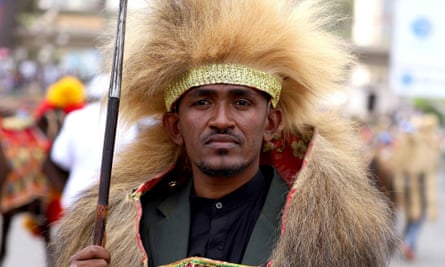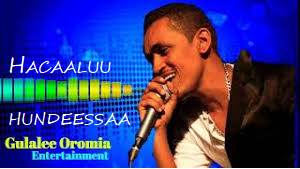HRW: Ethiopia Cracks Down Following Popular Singer’s Killing July 1, 2020
Posted by OromianEconomist in Uncategorized.Tags: Hacaaluu Hundeessaa, HRW
add a comment

Ethiopia Cracks Down Following Popular Singer’s Killing
Lift Internet Shutdown, Avoid Force at Protests, Free Unjustly Held Politicians

Laetitia Bader
Director, Horn of AfricaLaetitiaBaderLaetitiaBader
Protests erupted in several towns across Ethiopia in response to the June 29 killing of Hachalu Hundessa, a popular Oromo singer whose songs captured the struggles and frustrations of the Oromo people during the 2014-2018 anti-government protest movement. Unidentified gunmen shot Hundessa dead in Addis Ababa, the capital. Hundessa’s uncle was also reportedly killed in Ambo today.
While police claim to have made arrests in connection with Hundessa’s killing, the government’s responses to the protesters risks enflaming long-simmering tensions. On Tuesday morning the government cut internet services across the country, which only amplified concerns that people are being silenced and that human rights abuses and communal violence, having rocked the country last year, are not being addressed.
The internet shutdown has also made it impossible to access information on those killed and injured in the protests. One witness told us: “There is no network. We don’t have any information flow … the government only tells people [they] are investigating, and so everyone is hypothesizing based on current affairs.”
Despite the blackout, credible reports of violence are emerging. A regional government spokesman said that three explosions shook the capital, Addis Ababa, the morning after Hundessa’s killing. Meanwhile, independent media reports suggest that more than 80 people have been killed in the Oromia region and a further 10 people were killed in Adama after a government building was set on fire.
An activist in Nekemte, western Oromia, told Human Rights Watch that three protesters were killed after Oromia police opened fire. A doctor in the town of Dire Dawa said that the hospital had received eight people with gunshot injuries after reportedly being fired at by security forces, and that two soldiers had also been shot and injured.
The government’s response took another worrying turn when authorities arrested political opposition leaders Jawar Mohammed and Bekele Gerba of the Oromo Federalist Congress party, late Tuesday morning after a reported standoff with security forces over Hundessa’s funeral site. Jawar and Bekele were initially held incommunicado, but are now known to be held in Sostegna police station in Addis Ababa. While their families have now been allowed to bring them food and medicine, it is unclear if they have access to a lawyer. Bekele’s son and daughter were also arrested, and their whereabouts remain unknown.
The media has also reported that another prominent political opposition leader, Eskinder Nega, has also been detained.
Rather than restoring calm, the authorities’ internet shutdown, apparent excessive use of force, and arrest of political opposition figures could make a volatile situation even worse. The government should take prompt steps to reverse these actions or risk sliding deeper into crisis.
The Guardian: Ethiopia protests: more than 80 killed as singer’s murder lays bare grievances, July 1, 2020
Posted by OromianEconomist in Uncategorized.Tags: Hacaaluu Hundeessaa, The Guardian
add a comment
Ethiopia protests: more than 80 killed as singer’s murder lays bare grievances
Troops on Addis Ababa streets as political tensions erupt over Haacaaluu death and wider Oromo claims

Haacaaluu Hundeessaa in 2019. His music served as the soundtrack to Oromos opposing political exclusion. Photograph: Tiksa Negeri/ReutersReuters in Addis AbabaPublished onWed 1 Jul 2020 16.15 EDT
Ethiopian troops have been deployed in the country’s capital in a second day of unrest, sparked by the assassination of the popular musician Haacaaluu Hundeessaa, which has claimed more than 80 lives.
Protests after Haacaaluu’s murder on Monday tapped into grievances fuelled by decades of government repression and what the Oromo, Ethiopia’s biggest ethnic group, describe as their historic exclusion from political power.
“I am angry. It’s eating me inside,” said Ishetu Alemu, a protester, as tyres smouldered in the street behind him.
Gunshots could be heard in many neighbourhoods, and gangs armed with machetes and sticks roamed the streets. Witnesses described a situation pitting youths of Oromo origin against other ethnic groups and the police.
“We had a meeting with the community, and we were told to arm ourselves with anything we have, including machetes and sticks. We no longer trust the police to protect us so we have to prepare ourselves,” said one resident in the capital, Addis Ababa, who like others interviewed asked not to be named for fear of reprisals.
Many residents fear that Haacaaluu’s funeral, scheduled for Thursday in his home town, Ambo, could lead to more violence.
“Security forces have invaded our town, we can’t go out to mourn. No vehicles are moving around except security patrols with machine guns,” Chala Hunde, 27, a student, told Reuters by phone from Ambo, about 60 miles west of Addis. “The security forces are putting a finger in our wound.”
Prof Awol Allo, at Keele University, England, said a tussle over whether to bury Haacaaluu in Ambo or Addis had laid bare the political tensions fanning the protests. “It’s very contentious. Oromos claim the city [Addis] to be theirs, as it lies fully within the Oromo regional state.” But the capital is under federal, not regional control.
The state broadcaster reported the arrest of the prominent journalist and activist Eskinder Nega, a former political prisoner who runs a pressure group opposed to what it describes as Oromo attempts to dominate the capital.
The dispute over Addis triggered three years of bloody street demonstrations that led to the resignation of the previous prime minister and Abiy Ahmed’s appointment to the post in 2018. Haacaaluu’s music was the soundtrack to a generation of young Oromos who led the protests.
The regional police commissioner, Bedassa Merdassa, told the state-run Ethiopian Broadcasting Corporation on Wednesday that more than 80 people had been killed in the clashes in Oromiya on Tuesday, including protesters and three members of the security forces. The dead also included 78 civilians, he said.
Another potential flashpoint was the arrest on Tuesday of the Oromo opposition leader, Bekele Gerba, and the media mogul Jawar Mohammed.
Abiy, Haacaaluu and Jawar are all Oromo. The singer and media owner were more critical of the prime minister in recent months; some Oromo activists have accused Ethiopia’s 41-year-old prime minister of repression.
In federal Ethiopia power is traditionally derived through the control of large ethnic voting blocs. Under the previous administration voting was rarely free or fair; opposition activists were jailed, tortured or driven into exile.
Related, Oromia Economist Sources:
#Oromia: A New Phase of #OromoRevolution Tsegaye Ararssa #HacaaluuHundeessaa July 1, 2020
Posted by OromianEconomist in Uncategorized.Tags: #OromoProtests, #OromoProtests2020, Hacaaluu Hundeessaa, Tsegaye R. Ararssa
add a comment

A New Phase of #OromoRevolution,
By Dr. Tsegaye Ararssa #HacaaluuHundeessaa
As of yesterday, the struggle has entered a new phase. We now brace ourselves for a comprehensive set of protest measures as of this morning.A state-wide protest rallies are hoped to be staged from today on. It’s hoped that these protest measures will extend to other parts of the country as well.
The demands to be tabled are:
1. To give a dignified burial for Haacaaluu in Finfinnee–and that, after a proper examination of the cause of his death, identification of the assassins, and taking genuine measures for ensuring (legal, administrative, and political) accountability for the assassination;
2. To release all political prisoners including the leaders (e.g. Jawar Mohammed, Bekele Gerba, Hamza Borana, etc) and numerous other protesters arrested yestetday;3. Release the journalists, reporters, and other staff members of the Oromia Media Network (OMN) including its Executive Director, Girma Gutema;
4. Release the security personnel in charge of the security of the OMN premises and the residence of Jawar Mohammed; and
5. Take decisive measures to remove all historical relics of empire such as statues, flags, and symbols that insult the pluralist and federalist sensibilities of Oromos and all other nations in the country;
6. Stop the use of the media (conventional as well as social) to attack, misrepresent, and provoke the Oromo and the other ‘others’ of Ethiopia;
7. Stop the use of repressive military tactics that are deployed to terrorize, intimidate, and humiliate the people into submission;
8. Withdraw the military from the civilian lives of the local population;9. Start a genuinely inclusive discussion with all parties towards restoring constitutional rule, federalism, and rule of law, in a framework that eyes an election before the expiry of the term in October 2020.
10. Ensure that proper remedial measures are taken in order to redress victims of human rights violations in the past two years.Oromos from all walks of life shall be taking part in yhe protest measures. #Oromia_Protests_2020.
You must be logged in to post a comment.